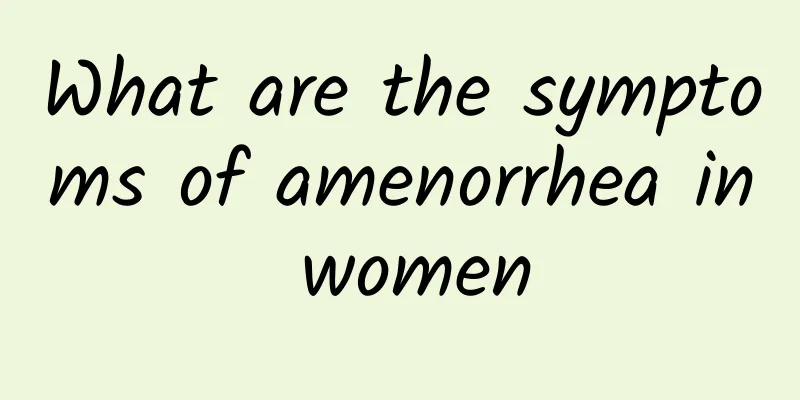What are the symptoms of amenorrhea in women

|
What are the symptoms of amenorrhea in women? Amenorrhea is particularly common in gynecological diseases. After the disease occurs, the menstrual cycle is disrupted, resulting in amenorrhea, which in turn causes harm to health. If the disease continues to progress, discomforts such as hirsutism, acne, abdominal pain, and palpitations will occur. Some patients will also have complications of hypothalamic-pituitary diseases, which will eventually worsen the condition. 1. Typical manifestations If there is no development of secondary sexual characteristics after the age of 14, or if there is development of secondary sexual characteristics but no menstruation after the age of 16, it is called amenorrhea. Some women usually have normal menstrual cycles, but due to gynecological diseases or other factors, menstruation is amenorrhea, which harms their health. 2. Accompanying performance If the patient has a disease with excessive androgen, such as polycystic ovary syndrome, they will experience acne, hirsutism and other discomforts at the same time as amenorrhea. Some patients have abnormal development of the reproductive tract, such as hymen occlusion or vaginal occlusion, and menstrual blood will accumulate in the reproductive tract and cannot be discharged normally, causing varying degrees of abdominal pain and swelling. If menopausal symptoms occur, it will cause hot flashes, palpitations, emotional instability, and cause the patient to lose concentration. 3. Other manifestations Some women have hypothalamic-pituitary disorders with headaches, vision problems, fatigue, and polyuria. 4. Complications If patients with amenorrhea suffer from the disease for a long time and do not receive effective treatment, the incidence of infertility will increase, which will in turn affect normal fertility. The symptoms of amenorrhea are the above knowledge. Considering the serious harm of amenorrhea, once timely treatment is needed, you can consult a gynecologist to choose treatment drugs, use them correctly, and control the progression of the disease. You should strengthen your own care, especially pay special attention to hygiene, eat a balanced diet during the onset of the disease, and reduce serious irritating foods. |
<<: How big does a uterine fibroid need to be removed surgically?
>>: Is it better to have an abortion or a medical abortion?
Recommend
Eat high-fiber fruits wisely to prevent obesity and fat
Modern people always eat out for three meals a da...
What are the tests for abnormal leucorrhea?
The examinations required for abnormal leucorrhea...
What is the usual treatment for chronic adnexitis?
Nowadays, the incidence of adnexitis is getting h...
What are the methods to eliminate ovarian cysts?
Is there a way to get rid of ovarian cysts? Surge...
Boost your immunity by sitting around the fire during Chinese New Year, and eat healthily with these 3 tips! Nutritionist teaches you how to make 6 homemade New Year dishes to help you lose weight and have a good New Year
During the Chinese New Year reunion, in addition ...
Symptoms of uterine fibroids How to treat uterine fibroids
Experts recommend that you treat uterine fibroids...
What drugs are available for the treatment of pelvic peritonitis?
Most women have gynecological inflammation. If gy...
Puff Girls have too much fat and too little muscle mass
Are you a "puff girl" who wants to lose...
What should female patients with cervical erosion eat? Diet therapy for patients with cervical erosion
If you suffer from cervical erosion, your health ...
Several methods to improve dysmenorrhea are urgent!
When it comes to dysmenorrhea, many people may su...
Excessive exercise leads to endometriosis. Diet therapy for endometriosis
Does excessive exercise cause endometriosis? What...
What are the different symptoms of cervicitis?
Experts say that different types of cervicitis ha...
What are the symptoms of cervical erosion in women? The body sends out 4 signals. Be careful of cervical erosion.
Cervical erosion mostly occurs in married women. ...
Symptoms of hyperprolactinemia
Hyperprolactinemia, if it is pathological, will h...
What symptoms of cervical erosion should be paid attention to
Many female friends don’t know much about the sym...









